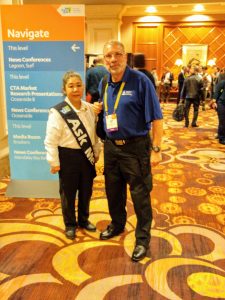By James R. Lint
Faculty Member, School of Business, American Military University
Contributor, In Homeland Security
The second media day at the CES® show presented by the Consumer Technology Association (CTA™) gave the press a look into the future of technology. Companies that made presentations included LG, Bosch, Panasonic, Casio, Toyota, Samsung, Carnival and Hyundai.
Tim Baxter, president of Samsung Electronics America, discussed how the company’s recent acquisition of Harman International Industries, Inc., will help improve the sound quality of Samsung devices.
Samsung introduced its new QLED television with improved color quality using Quantum Dot technology. The company also has rolled out improved Google and Apple apps for TV remote controllers. Samsung says using phones as controllers personalizes TV controls far better than the old controllers did.
Samsung’s new “four in one” washing machines and dryers can do two washing and drying loads simultaneously with just two machines. Also, the washers and dryers can be controlled remotely through the Internet of Things (IoT).
Samsung’s new refrigerators can act as the family calendar and display what is inside the refrigerator. The refrigerator can also recommend recipes based on what is on its shelves.
MobileHelp, a medical supply company, exhibited tools for use in telemedicine. Medical costs can be reduced considerably when people recover at home. Also, the company’s medical alert tools can reduce the need for and costs of visiting nurses. Blood pressure and weight monitoring can be done easily via home monitoring. Fall response products, designed primarily for older adults, could also be used for military and veterans medical systems.
Casio has developed a new watch for outdoor enthusiasts called the Pro Trek Smart WSD-F20. It has a built-in GPS full-color map and works offline and out of range of mobile connections. Its software is built on the foundation of Androidwear, which is advertised as Casio Connected.
Hyundai Motor Company showcased its advanced self-driving technology Autonomous IONIQ cars. This vehicle differs from the Chrysler Portal concept car described in a recent article in InCyberDefense.
The Hyundai IONIQ is designed to look very much like a standard car in 2016. But Hyundai’s LiDAR technology retains the new car’s sleek design because the hardware is hidden behind the Autonomous IONIQ’s front bumper rather than on the typical roof-mounted device.
Hyundai’s CES booth demonstrates how the “hyper-connected car” will add greater convenience, comfort and enjoyment to tomorrow’s lifestyles. The Korean automaker has teamed with Cisco to create greater connectivity and security for new cars. The joint program will create a platform optimized for connected cars that will enable two-way communication between the cars’ systems and externally with road infrastructure, other vehicles, the Internet of Things (loT) devices, and the cloud.
The only mention of security and security of connected devices came in a brief talk by Cisco team members during the Hyundai presentation. The lack of any discussion on security was disappointing. But it was reassuring to hear how security would be built into the Hyundai ”hyper-connected car” of the future. Without that focus, our future might not be so bright.
About the Author
James R. Lint recently retired as the (GG-15) civilian director for intelligence and security, G2, U.S. Army Communications Electronics Command. He is an adjunct professor at AMU. James has been involved in cyberespionage events from just after the turn of the century in Korea supporting 1st Signal Brigade to the DHS Office of Intelligence and Analysis as the first government cyber intelligence analyst. He has 38 years of experience in military intelligence with the U.S. Marine Corps, U.S. Army, government contracting and civil service.
Additionally, James started the Lint Center for National Security Studies, a nonprofit charity that recently awarded its 43rd scholarship for national security students and professionals. James was also elected as the 2015 national vice president for the Military Intelligence Corps Association. He has also served in the Department of Energy’s S&S Security Office after his active military career in the Marine Corps for seven years and also served 14 years in the Army. His military assignments include South Korea, Germany and Cuba in addition to numerous CONUS locations. James has authored a book published in 2013, “Leadership and Management Lessons Learned,” and a new book in 2016 “8 Eyes on Korea, A Travel Perspective of Seoul, Korea.”

Comments are closed.